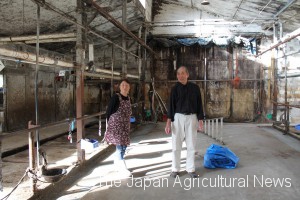
Shoichi Narita (right) and his wife Hiroko stand in an empty barn at their farm in Nemuro, Hokkaido.
HOKKAIDO, Nov. 6 – “No more sound of buckets
No more sound of cows mooing
No more sound of milkers
No more sound of bulk coolers
Every sound of production is completely gone
Silence
Desolation
Tears
Tears”
Shoichi Narita, 77, a dairy farmer of Nemuro, Hokkaido, wrote this poem to thank his cows, his farm and his fellow farmers who supported him, after he sold all his cows and gave up farming in October.
Narita had been running his farm which his grandfather reclaimed in the Meiji Era, keeping 120 cows on a 100-hectare land. But following a major earthquake that hit Hokkaido in September, Narita, his wife Hiroko, 73, and their son Hiroshi, 47, decided to quit farming.
Narita is one of many farmers in Hokkaido who gave up their business after suffering damage due to the earthquake and the blackout that followed. The disasters have hit hard especially on dairy farmers who have introduced large-scale farming as they have to make a large amount of investment to recover from the damage.
After his farm was left with no electrical power for several days, Narita couldn’t milk his cows and he said he could hear his cows’ screams leaking from the barns. When he disposed of all the stored milk which was damaged due to power shortage, his son suggested that they close the business.
If they were to continue their business, they would have to make investments to renew their 25-year-old barns and other machinery, which would leave them with debts reaching hundreds of millions of yen.
“The earthquake triggered (our decision to quit). We don’t know when the next disaster will come,” Narita said, adding that the recent bullish run of the cattle market has also helped him make the difficult decision.
Narita remembers the time when, at the age of 25, he became the first farmer in eastern Hokkaido to participate in a homestay program in Australia and was given a heartfelt send-off by all the farmers in the district, being presented with a camera by a local farm cooperative.
In 1975, when he took part in a cattle contest held in Hyogo Prefecture representing Hokkaido, his fellow farmers took turns to help milk his other cows while he was away. His wife Yoko said she still clearly remembers the handmade banner strung up across a 11-ton vehicle.
Forty years ago, there were 20 dairy farmers in the district where Narita lives, but there are only four left today. Although milking robots and the supporter dispatching system have helped increase dairy farmers’ free time, Narita said they are still facing the need to make decisions whether to continue farming in the area, where schools and railroads are being closed due to depopulation.
“Dairy farmers have to suffer no matter which way they take – give up farming or be in debt (to renew their facilities),” he said. “I doubt if only seeking further corporatization of dairy farms is really the right thing to do.”
Narita says it was hard for him to give away his cows, considering that his parents, and he himself, had struggled to continue business amid rapid fluctuations of milk prices. He said he sent off the trucks carrying the cows with tears and a deep bow. His wife Hiroko, who grew up in a dairy farm herself, said she saw them off from the window, being unable to go outside.
Narita, who still wakes up early in the morning as he used to do when he was milking the cows, said he wrote poems to express gratitude to his cows, his family and the community. He sent the poems to the people in his community, after typing them – to make them easier to read – with a PC which he is not accustomed to using.
“(The poems are) a token of my appreciation,” he said, looking at the empty barns.

